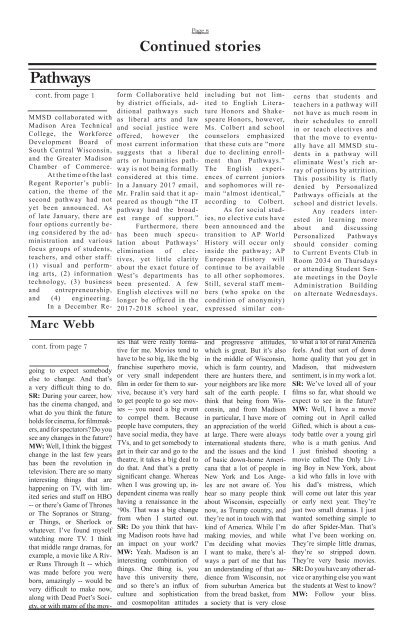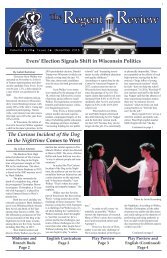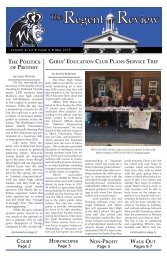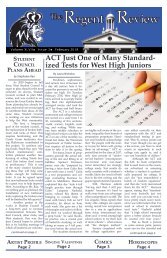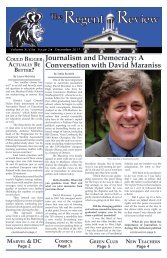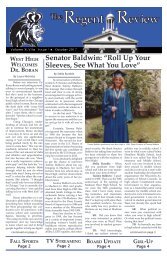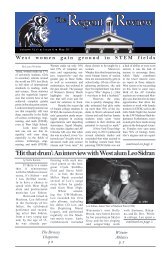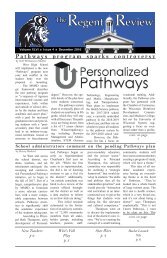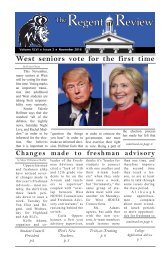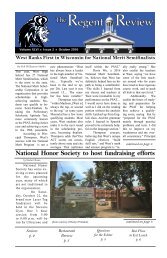You also want an ePaper? Increase the reach of your titles
YUMPU automatically turns print PDFs into web optimized ePapers that Google loves.
Page 8<br />
Continued stories<br />
Pathways<br />
cont. from page 1<br />
MMSD collaborated with<br />
Madison Area Technical<br />
College, the Workforce<br />
Development Board of<br />
South Central Wisconsin,<br />
and the Greater Madison<br />
Chamber of Commerce.<br />
At the time of the last<br />
<strong>Regent</strong> Reporter’s publication,<br />
the theme of the<br />
second pathway had not<br />
yet been announced. As<br />
of late January, there are<br />
four options currently being<br />
considered by the administration<br />
and various<br />
focus groups of students,<br />
teachers, and other staff:<br />
(1) visual and performing<br />
arts, (2) information<br />
technology, (3) business<br />
and entrepreneurship,<br />
and (4) engineering.<br />
In a December Reform<br />
Collaborative held<br />
by district officials, additional<br />
pathways such<br />
as liberal arts and law<br />
and social justice were<br />
offered, however the<br />
most current information<br />
suggests that a liberal<br />
arts or humanities pathway<br />
is not being formally<br />
considered at this time.<br />
In a January <strong>2017</strong> email,<br />
Mr. Fralin said that it appeared<br />
as though “the IT<br />
pathway had the broadest<br />
range of support.”<br />
Furthermore, there<br />
has been much speculation<br />
about Pathways’<br />
elimination of electives,<br />
yet little clarity<br />
about the exact future of<br />
West’s departments has<br />
been presented. A few<br />
English electives will no<br />
longer be offered in the<br />
<strong>2017</strong>-2018 school year,<br />
including but not limited<br />
to English Literature<br />
Honors and Shakespeare<br />
Honors, however,<br />
Ms. Colbert and school<br />
counselors emphasized<br />
that these cuts are “more<br />
due to declining enrollment<br />
than Pathways.”<br />
The English experiences<br />
of current juniors<br />
and sophomores will remain<br />
“almost identical,”<br />
according to Colbert.<br />
As for social studies,<br />
no elective cuts have<br />
been announced and the<br />
transition to AP World<br />
History will occur only<br />
inside the pathway; AP<br />
European History will<br />
continue to be available<br />
to all other sophomores.<br />
Still, several staff members<br />
(who spoke on the<br />
condition of anonymity)<br />
expressed similar concerns<br />
that students and<br />
teachers in a pathway will<br />
not have as much room in<br />
their schedules to enroll<br />
in or teach electives and<br />
that the move to eventually<br />
have all MMSD students<br />
in a pathway will<br />
eliminate West’s rich array<br />
of options by attrition.<br />
This possibility is flatly<br />
denied by Personalized<br />
Pathways officials at the<br />
school and district levels.<br />
Any readers interested<br />
in learning more<br />
about and discussing<br />
Personalized Pathways<br />
should consider coming<br />
to Current Events Club in<br />
Room 2034 on Thursdays<br />
or attending Student Senate<br />
meetings in the Doyle<br />
Administration Building<br />
on alternate Wednesdays.<br />
Marc Webb<br />
cont. from page 7<br />
going to expect somebody<br />
else to change. And that’s<br />
a very difficult thing to do.<br />
SR: During your career, how<br />
has the cinema changed, and<br />
what do you think the future<br />
holds for cinema, for filmmakers,<br />
and for spectators? Do you<br />
see any changes in the future?<br />
MW: Well, I think the biggest<br />
change in the last few years<br />
has been the revolution in<br />
television. There are so many<br />
interesting things that are<br />
happening on TV, with limited<br />
series and stuff on HBO<br />
-- or there’s Game of Thrones<br />
or The Sopranos or Stranger<br />
Things, or Sherlock or<br />
whatever. I’ve found myself<br />
watching more TV. I think<br />
that middle range dramas, for<br />
example, a movie like A River<br />
Runs Through It -- which<br />
was made before you were<br />
born, amazingly -- would be<br />
very difficult to make now,<br />
along with Dead Poet’s Society,<br />
or with many of the movies<br />
that were really formative<br />
for me. Movies tend to<br />
have to be so big, like the big<br />
franchise superhero movie,<br />
or very small independent<br />
film in order for them to survive,<br />
because it’s very hard<br />
to get people to go see movies<br />
-- you need a big event<br />
to compel them. Because<br />
people have computers, they<br />
have social media, they have<br />
TVs, and to get somebody to<br />
get in their car and go to the<br />
theatre, it takes a big deal to<br />
do that. And that’s a pretty<br />
significant change. Whereas<br />
when I was growing up, independent<br />
cinema was really<br />
having a renaissance in the<br />
‘90s. That was a big change<br />
from when I started out.<br />
SR: Do you think that having<br />
Madison roots have had<br />
an impact on your work?<br />
MW: Yeah. Madison is an<br />
interesting combination of<br />
things. One thing is, you<br />
have this university there,<br />
and so there’s an influx of<br />
culture and sophistication<br />
and cosmopolitan attitudes<br />
and progressive attitudes,<br />
which is great. But it’s also<br />
in the middle of Wisconsin,<br />
which is farm country, and<br />
there are hunters there, and<br />
your neighbors are like more<br />
salt of the earth people. I<br />
think that being from Wisconsin,<br />
and from Madison<br />
in particular, I have more of<br />
an appreciation of the world<br />
at large. There were always<br />
international students there,<br />
and the issues and the kind<br />
of basic down-home Americana<br />
that a lot of people in<br />
New York and Los Angeles<br />
are not aware of. You<br />
hear so many people think<br />
about Wisconsin, especially<br />
now, as Trump country, and<br />
they’re not in touch with that<br />
kind of America. While I’m<br />
making movies, and while<br />
I’m deciding what movies<br />
I want to make, there’s always<br />
a part of me that has<br />
an understanding of that audience<br />
from Wisconsin, not<br />
from suburban America but<br />
from the bread basket, from<br />
a society that is very close<br />
to what a lot of rural America<br />
feels. And that sort of down<br />
home quality that you get in<br />
Madison, that midwestern<br />
sentiment, is in my work a lot.<br />
SR: We’ve loved all of your<br />
films so far, what should we<br />
expect to see in the future?<br />
MW: Well, I have a movie<br />
coming out in April called<br />
Gifted, which is about a custody<br />
battle over a young girl<br />
who is a math genius. And<br />
I just finished shooting a<br />
movie called The Only Living<br />
Boy in New York, about<br />
a kid who falls in love with<br />
his dad’s mistress, which<br />
will come out later this year<br />
or early next year. They’re<br />
just two small dramas. I just<br />
wanted something simple to<br />
do after Spider-Man. That’s<br />
what I’ve been working on.<br />
They’re simple little dramas,<br />
they’re so stripped down.<br />
They’re very basic movies.<br />
SR: Do you have any other advice<br />
or anything else you want<br />
the students at West to know?<br />
MW: Follow your bliss.


